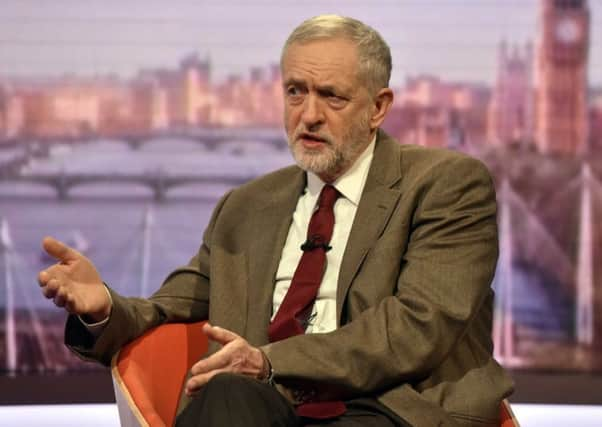Jeremy Corbyn: UK can keep Trident fleet without warheads


The Labour leader said there ere “options” for maintaining defence jobs while at the same time showing the UK was willing to take a lead in nuclear “de-escalation”.
Reiterating his long-standing opposition to the nuclear deterrent based at Faslane on the Clyde, he said the submarines could instead carry conventional weapons. Trade unions fear scrapping Trident would cost tens of thousands of jobs in the defence industry, but Mr Corbyn said protecting workers was his “first priority”.
Advertisement
Hide AdAdvertisement
Hide AdThe proposal was dismissed by a pro-Trident Labour MP as “implausible”, while the Conservatives said it showed Mr Corbyn and his party pose a “threat to national security”.
Mr Corbyn is at odds with many of his own MPs over the future of the UK nuclear weapons system, which will cost an estimated £60 billion to renew. He has commissioned a review, led by shadow defence secretary Emily Thornberry, into its future.
The House of Commons is expected to vote on whether to renew Trident by building four new Vanguard submarines later this year.
Mr Corbyn said Trident was a relic from a “Cold War generation” incapable of protecting the UK from current threats and that he did not believe Prime Minister David Cameron would ever contemplate using it.
Asked in that case what would be the point of having at least one submarine on constant patrol, Mr Corbyn said: “They don’t have to have warheads on them.”
He added: “If anyone uses a nuclear weapon it is catastrophic for the whole globe … There are options there.”
Speaking on the BBC’s Andrew Marr show, Mr Corbyn added: “The paper that Emily Thornberry has put forward is a very interesting one and deserves a good study.
“I hope that there will be a serious and mature response to what is a very serious and hopefully mature debate about the nature of security and insecurity, the nature of the way in which we protect ourselves against insecurity and we bring about a more secure world as a result.”
Advertisement
Hide AdAdvertisement
Hide AdMs Thornberry later confirmed she was looking at the “Japanese option” – retaining the capacity to build nuclear weapons without actually possessing them.
“That’s certainly one of the things that needs to be looked at,” she said.
But Labour’s John Woodcock, the MP for Barrow and Furness where the replacement submarines will be built, said: “Having a deterrent that has no ability to deter because it has no missiles is like having an army with broken rifles and no ammunition.
“It is deeply frustrating because every day that we spend debating implausible schemes like this is a day we are not able to hold the Conservative government to account.”
Defence expert Tim Ripley also cast doubt on Mr Corbyn’s suggestion, as Trident submarines are designed specifically to carry nuclear warheads and not conventional weapons.
Mr Ripley said: “To just take nukes off Trident would not work as the submarines are purpose designed. They are not designed to do otherwise. It would involve spending a lot of money to not do very much.”
Defence Secretary Michael Fallon said Mr Corbyn’s comments showed Labour was a threat to Britain’s national security.
He said: “Labour would weaken Britain’s defences by having a nuclear deterrent without any nuclear weapons and would weaken our economy by changing the law to increase the number of disruptive strikes,” he said.
Advertisement
Hide AdAdvertisement
Hide Ad“That’s why Labour are a threat to the security of every working family.”
Shadow chancellor John McDonnell said the jobs of workers employed at Faslane will be guaranteed and promised to listen to concerns about employment on the Clyde expressed by Unite general secretary Len McCluskey.
Mr Corbyn risked further controversy yesterday by suggesting there could be a line of communication with Islamic State (IS) – also referred to as Isil – drawing comparisons with the “back channel” between the government and the IRA during the Troubles in Northern Ireland.
“There has to be a route through somewhere. A lot of the commanders in Isil – particularly in Iraq – are actually former officers in the Iraqi army,” he said.
On the Falklands, while Mr Corbyn said the islanders should have an “enormous say” in any discussions with Argentina, he stopped short of saying they should have a veto over any new arrangements.
“I think there has to be a discussion with Argentina,” he said.
Richard Benyon, a Conservative member of the Commons defence committee, dismissed the idea of talks with IS
“When you see what is going on in parts of Syria and Iraq, [the idea] you could sit down with these people and have a reasonable conversation is completely absurd,” he said.